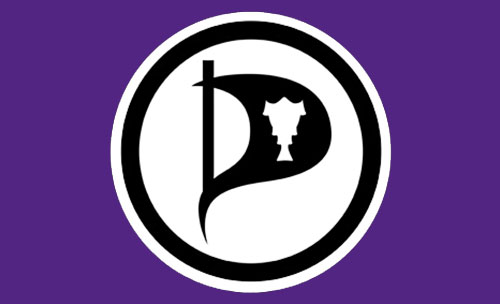
Founded ten years ago by Rick Falkvinge, over the years the Swedish (and first) Pirate party grew into a considerable political movement.
Against what some believed were insurmountable odds, Pirates were even able to put their representatives into the European Parliament, where German politician Julia Reda has been a Member since 2014.
While local variants continue to ebb and flow elsewhere, over in Iceland there's an intriguing situation playing out which has seen the Pirates transform from fresh-faced upstart to political powerhouse.
In 2013 (and after just a few months of existence) the Icelandic Pirate Party picked up a notable 5.1% of the vote, meaning that the party entered the national government with three Members of Parliament. But now, just three years later, a dramatic situation is playing out.
According to the results of a new poll published Friday, the Icelandic Pirate Party now appears to count on the support of a staggering 38.1% of the population. To put that into perspective, that means that if elections were held today, the party would leap from the three seats it currently holds to a massive 26 seats.
While all survey results should be received with caution, if these figures can be maintained it means that the Pirates would oust the incumbents to become the most significant player in the country's parliament.
The survey, carried out by 365 Media, found that The Independence Party is roughly maintaining the 27.6% of the vote it achieved in the 2013 elections. However, The Progressives have dropped from 24.4% to 12.8%.
If that prediction plays out the two parties combined would plummet from the 38 seats they currently hold to just 27, meaning that if people went to the polls today the parties would lose their parliamentary majority.
In fact, as the Grapevine frames it, not only are the Pirates now the country's largest political party, but no two-party ruling coalition could be formed in Iceland without including the Pirates.
Typically, however, the Icelandic Pirates are taking the latest poll results in their stride.
Instead of the unbridled celebrations one might expect, they're remaining ever level-headed.
"I just do not know. I do not judge it," says "shocked" Pirate MP Helgi Hrafn Gunnarsson.
While the Pirates are exercising caution, the pattern seems clear. In early 2015 the party was predicted to take 23.9% of the votes, a figure that had swelled to 34.2% last October.
Nevertheless, there is still a way to go.
Elections don't take place until 2017 and the party has already made it clear that it is seeking change rather than the ability to take power.
"We don't really want to govern, but rather have the system working as a whole where everyone in it has responsibility for their actions," Pirate MP Ásta Helgadóttir previously told TF.

